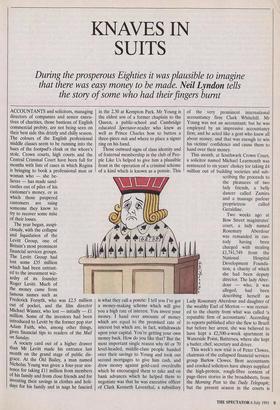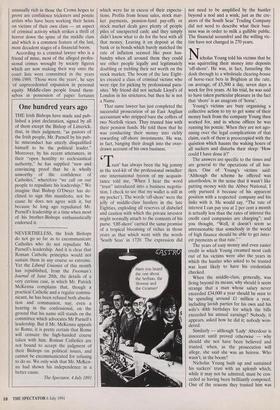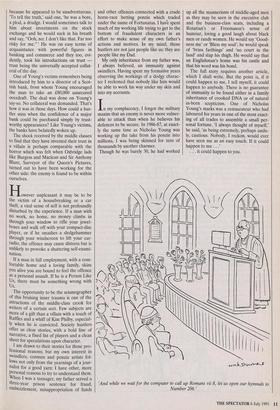KNAVES IN SUITS
During the prosperous Eighties it was plausible to imagine
that there was easy money to be made. Neil Lyndon tells
the story of some who had their fingers burnt
ACCOUNTANTS and solicitors, managing directors of companies and senior execu- tives of charities, those bastions of English commercial probity, are not being seen on their best side this drizzly and chilly season. The colours of the English professional middle classes seem to be running into the hues of the footpad's cloak or the whore's stole. Crown courts, high courts and the Central Criminal Court have been full for months with lists of cases in which Regina is bringing to book a professional man or woman who — she be- lieves — has made sand- castles out of piles of his customer's money, or in which those paupered customers are suing someone they know to try to recover some mite of their losses.
The year began, auspi- ciously, with the collapse and liquidation of the Levitt Group, one of Britain's most prominent financial services groups.
The Levitt Group had lost some £35 million which had been entrust- ed to the investment wiz- ardry of its founder Roger Levitt. Much of the money came from famous names such as Frederick Forsyth, who was £2.5 million out of pocket, and the film director Michael Winner, who lost — initially — £1 million. Some of the investors had been introduced to Levitt by the former pop star Adam Faith, who, among other things, gives financial tips to readers of the Mail on Sunday.
A society card out of a higher drawer than Mr Levitt made his entrance last month on the grand stage of public dis- grace. At the Old Bailey, a man named Nicholas Young was given a four-year sen- tence for taking £11 million from members of his family and from close friends and for investing their savings in clothes and holi- days for his family and in nags he fancied in the 2.30 at Kempton Park. Mr Young is the eldest son of a former chaplain to the Queen, a public-school and Cambridge educated Spectator-reader who knew as well as Prince Charles how to button a three-piece suit and where to place a signet ring on his hand. Those outward signs of class identity and of fraternal membership in the club of Peo- ple Like Us helped to give him a plausible front in the operation of a criminal scheme of a kind which is known as a ponzie. This is what they call a ponzie: I tell you I've got a money-making scheme which will give you a high rate of interest. You invest your money. I hand over amounts of money which are equal to the promised rate of interest but which are, in fact, withdrawals upon your capital. You're getting your own money back. How do you like that? But the most important single reason why 60 or 70 level-headed, middle-class people handed over their savings to Young and took out second mortgages to give him cash, and drew money against gold-card overdrafts which he encouraged them to take and on bank advances which he helped them to negotiate was that he was executive officer of Clark Kenneth Leventhal, a subsidiary of the very prominent international accountancy firm Clark Whitehill. Mr Young was not an accountant; but he was employed by an impressive accountancy firm; and he acted like a gent who knew all about money; and that was enough to win his victims' confidence and cause them to hand over their money.
This month, at Southwark Crown Court, a solicitor named Michael Learmonth was sentenced to six years' chokey for taking £4 million out of building societies and sub- scribing the proceeds to the pleasures of two lady friends, a belly dancer called Zamira and a massage parlour proprietress called Geraldine.
Two weeks ago at Bow Street magistrates' court, a lady named Rosemary Aberdour was remanded in cus- tody having been charged with stealing £1,741,749 from the National Hospital Development Founda- tion, a charity of which she had been deputy director. The lady Aber- dour — who, it was alleged, had been describing herself as Lady Rosemary Aberdour and daughter of the wealthy Earl of Morton — was recruit- ed to the charity from what was called 'a reputable firm of accountants'. According to reports published after she flew to Brazil but before her arrest, she was believed to have kept a £2,500-a-week apartment in Waterside Point, Battersea, where she kept a butler, chef, secretary and driver.
This week's new trial is of Peter Clowes, chairman of the collapsed financial services group Barlow Clowes. Bent accountants and crooked solicitors have always supplied the high-protein, rough-fibre content of page-three stories in the broadsheets, from the Morning Post to the Daily Telegraph; but the present season in the courts is unusually rich in those the Crown hopes to prove are confidence tricksters and ponzie artists who have been working their heists on victims of their own class — an aspect of criminal activity which strikes a thrill of horror down the spine of the middle class and which is a common feature of the last, most decadent stages of a financial boom.
According to a criminal lawyer who is a friend of mine, most of the alleged profes- sional crimes wrought by society figures which are now making their way onto the court lists were committed in the years 1986-1989. 'Those were the years', he says `of unprecedented expansion in personal equity. Middle-class people found them- selves in possession of paper fortunes
which were far in excess of their expecta- tions. Profits from house sales, stock mar- ket payments, pension-fund pay-offs or stock market deals gave plenty of people piles of unexpected cash; and they simply didn't know what to do for the best with all that money. Leaving it on deposit at the bank or in bonds which barely matched the rate of inflation seemed like poor hus- bandry when all around them they could see other people legally and legitimately doubling or trebling their net worth on the stock market. The boom of the late Eight- ies created a class of criminal victims who were ripe for picking by professional para- sites.' My friend did not include Lloyd's of London in his strictures, but then he is not a Name.
That same lawyer has just completed the successful prosecution of an East Anglian accountant who stripped bare the coffers of two Norfolk vicars. They trusted him with their pension funds. He told them that he was conducting their money into richly rewarding off-shore investments. He was, in fact, banging their dough into the over- drawn account of his own business.
rust' has always been the big jemmy in the tool-kit of the professional swindler: one international tycoon of my acquain- tance told me, 'When I hear the word "trust" introduced into a business negotia- tion, I check to see that my wallet is still in my pocket'). The words 'off-shore' were the jelly of middle-class hustlers in the late Eighties, exploding all reserves of disbelief and caution with which the private investor might normally attach to the contents of his purse. 'Off-shore' carried the same promise of a tropical blooming of riches in those years as that which went with the words `South Seas' in 1720. The expression did
T
not need to be amplified by the hustler beyond a nod and a wink; just as the cre- ators of the South Seas' Trading Company did not need to describe what their busi- ness was in order to milk a gullible public. The financial scoundrel and the willing vic- tim have not changed in 270 years.
icholas Young told his victims that he was squirreling their money into deposits `off-shore'. He was, in fact, funneling the dosh through to a wholesale clearing-house of horse-race bets in Brighton at the rate, on average, of £5,500 a day, seven days a week for five years. At his trial, he was said to have taken particular pleasure in the fact that 'shore' is an anagram of 'horse'.
Young's victims are busy organising a collective action to try to get some of their money back from the company Young then worked for, and in whose offices he was running his ponzie. When they are not ago- nising over the legal complications of that claim, each of them is preoccupied with the question which haunts the waking hours of all suckers and disturbs their sleep: 'How could I have done it?'
The answers are specific to the times and are general to the operations of all hus- tlers. One of Young's victims said: `Although the scheme he offered was unorthodox, in the sense that it wasn't like putting money with the Abbey National, I only pursued it because of his apparent position with a respected company and his links with it. He would say, "The rate of interest I can pay you at 2 per cent a month is actually less than the rates of interest the credit card companies are charging"; and you thought, "Well, it doesn't seem so unreasonable that somebody in the world of high finance should be able to get inter- est payments at that rate." ' The years of easy money and even easier credit in which Young creamed most cash out of his victims were also the years in which the hustler who asked to be trusted was least likely to have his credentials checked.
When the middle-class, generally, was living beyond its means, why should it seem strange that a man whose salary never exceeded £34,000 a year should be seen to be spending around £1 million a year, including lavish parties for his own and his wife's 40th birthdays for which the bills exceeded his annual earnings? Nobody, it appears, asked how he did it; nobody won- dered.
Similarly — although 'Lady' Aberdour is innocent until proved otherwise — why should she not have been believed and trusted, when, as the prosecution will allege, she said she was an heiress. Who wasn't, in the boom?
Nicholas Young built up and sustained his suckers' trust with an aplomb which, while it may not be admired, must be con- ceded as having been brilliantly composed. One of the reasons they trusted him was
N
because he appeared to be unadventurous. To tell the truth,' said one, 'he was a bore, a plod, a drudge. I would sometimes talk to him about investments on the stock exchange and he would suck in his breath and say, "Ooh, no: I don't like that. Far too risky for me."' He was on easy terms of acquaintance with powerful figures in banking and commerce and they too, evi- dently, took his introductions on trust trust being the universally accepted collat- eral of the day.
One of Young's victims remembers being introduced by him to a director of a Scot- tish bank, from whom Young encouraged the man to take an £80,000 unsecured overdraft. The deal was done on Young's say-so. No collateral was demanded. That's how it was in those days. How could a hus- tler miss when the confidence of a major bank could be purchased simply by trust- worthy appearances? Like Young's victims, the banks have belatedly woken up.
The shock received by the middle classes to find that they have invested their trust in a villain is perhaps comparable with the horror which was felt when Oxbridge lads like Burgess and Maclean and Sir Anthony Blunt, Surveyor of the Queen's Pictures, turned out to have been working for the other side: the enemy is found to be within ourselves.
However unpleasant it may be to be the victim of a housebreaking or a car theft, a vital sense of self is not profoundly disturbed by the experience. If a man with no work, no home, no money climbs in through your window to rifle your jewel- boxes and walk off with your compact-disc player, or if he smashes a sledgehammer through your windscreen to lift your car- radio, the offence may cause distress but is unlikely to provoke a shattering self-exami- nation.
If a man in full employment, with a com- fortable home and a loving family, skins you alive you are bound to feel the offence as a personal assault. If he is a Person Like Us, there must be something wrong with Us.
The opportunity to be the seismographer of this bruising inner trauma is one of the attractions of the middle-class crook for writers of a certain sort. Few subjects are more of a gift than a villain with a touch of Raffles and a whiff of Kim Philby, especial- ly when he is convicted. Society hustlers offer us clear stories, with a bold line of narrative, a fixed list of players and a clean sheet for speculations upon character. I am drawn to their stories for those pro- fessional reasons; but my own interest in swindlers, conmen and ponzie artists fol- lows not only from the yearnings of a jour- nalist for a good yarn: I have other, more personal reasons to try to understand them. When I was a teenager, my father served a three-year prison sentence for fraud, embezzlement, misappropriation of funds and other offences connected with a crude horse-race betting ponzie which traded under the name of Fortunatus. I have spent much of my working life trying to get to the bottom of fraudulent characters in an effort to make sense of my own father's actions and motives. In my mind, those hustlers are not just people like us; they are people like my Dad.
My only inheritance from my father was, I always believed, an immunity against swindlers. Having spent my formative years observing the workings of a dodgy charac- ter I reckoned that nobody like him would be able to work his way under my skin and into my accounts.
In my complacency, I forgot the military maxim that an enemy is never more vulner- able to attack than when he believes his defences to be secure. In 1986-87, at exact- ly the same time as Nicholas Young was working up the take from his ponzie into millions, I was being skinned for tens of thousands by another charmer.
Though he was barely 30, he had worked up all the mannerisms of middle-aged men as they may be seen in the executive club and the business-class seats, including a Rotarian's or Freemason's sense of humour, loving a good laugh about black men or randy women. He would say 'Good- ness me' or 'Bless my soul'; he would speak of 'brass farthings' and `no court in the land' and slap his thigh. He would say that an Englishman's home was his castle and that his word was his bond.
The full story requires another article, which I shall write. But the point is, if it could happen to me, I tell myself, it could happen to anybody. There is no guarantee of immunity to be found either in a family inheritance of crooked DNA or of natural in-born scepticism. One of Nicholas Young's marks was a restaurateur who had laboured for years in one of the most exact- ing of all trades to assemble a small per- sonal fortune. 'I always thought of myself,' he said, 'as being extremely, perhaps undu- ly, cautious. Nobody, I reckon, would ever have seen me as an easy touch. If it could happen to me . .
. . . it could happen to you.
`And while we wait for the computer to call up Romans vii 8, let us open our hymnals to Number 206.'




















































 Previous page
Previous page